| Listing 1 - 10 of 14 | << page >> |
Sort by
|

ISBN: 2862742651 9782862742656 Year: 1993 Publisher: Paris: Le cherche midi,
Abstract | Keywords | Export | Availability | Bookmark
 Loading...
Loading...Choose an application
- Reference Manager
- EndNote
- RefWorks (Direct export to RefWorks)
French language --- Sociolinguistics --- Language and languages --- Philosophy --- Language and languages - Philosophy --- French language - 20th century
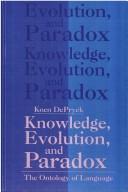
ISBN: 0791415333 0791415341 9780791415337 Year: 1993 Publisher: Albany : State University of New York Press,
Abstract | Keywords | Export | Availability | Bookmark
 Loading...
Loading...Choose an application
- Reference Manager
- EndNote
- RefWorks (Direct export to RefWorks)
Language and languages --- Philosophy. --- Langage et langues --- Philosophy --- Philosophie --- Language and languages - Philosophy.
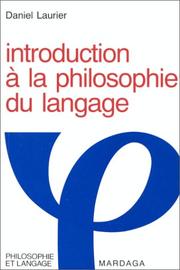
ISBN: 2870095260 9782870095263 Year: 1993 Volume: *91 Publisher: Liège: Mardaga,
Abstract | Keywords | Export | Availability | Bookmark
 Loading...
Loading...Choose an application
- Reference Manager
- EndNote
- RefWorks (Direct export to RefWorks)
Philosophie du langage --- Taalfilosofie --- Philosophy of language --- Language and languages --- Philosophy. --- Langage et langues --- Philosophy --- Philosophie --- Language and languages - Philosophy.
Book
ISBN: 2070729583 9782070729586 Year: 1993 Publisher: [Paris] : Gallimard,
Abstract | Keywords | Export | Availability | Bookmark
 Loading...
Loading...Choose an application
- Reference Manager
- EndNote
- RefWorks (Direct export to RefWorks)
Aphorisms and apothegms --- Language and languages --- Logic --- Aphorismes et apophtegmes --- Langage et langues --- Logique --- Philosophy --- Philosophie --- Langage --- --Philosophie --- --Logic, symbolic and mathematical --- Philosophie anglaise --- Sémantique --- Logic, symbolic and mathematical --- Language and languages - Philosophy
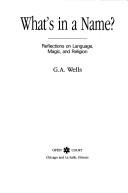
ISBN: 0812692381 081269239X 9780812692389 Year: 1993 Publisher: Chicago : Open Court,
Abstract | Keywords | Export | Availability | Bookmark
 Loading...
Loading...Choose an application
- Reference Manager
- EndNote
- RefWorks (Direct export to RefWorks)
Language and languages --- Magic --- Religion --- Thought and thinking --- Langage et langues --- Magie --- Pensée --- Philosophy --- Controversial literature --- Philosophie --- Ouvrages de controverse --- Thought and thinking. --- Philosophy. --- Controversial literature. --- Pensée --- Language and languages - Philosophy. --- Religion - Controversial literature.
Book
ISSN: 12429066 ISBN: 287711094X 9782877110945 Year: 1993 Publisher: Nîmes : Jacqueline Chambon,
Abstract | Keywords | Export | Availability | Bookmark
 Loading...
Loading...Choose an application
- Reference Manager
- EndNote
- RefWorks (Direct export to RefWorks)
Truth --- Vérité --- Langage --- --Sémantique --- --Philosophie analytique --- --Language and languages --- Philosophy. --- Reference (Philosophy). --- Meaning (Philosophy). --- Language and languages --- Référence (Philosophie) --- Signification (Philosophie) --- Langage et langues --- Philosophie --- Référence (Philosophie) --- Sémantique --- Philosophie analytique --- Language and languages - Philosophy.
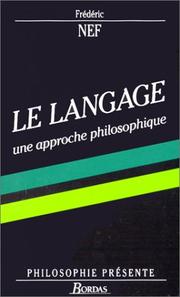
ISBN: 2040181024 9782040181024 Year: 1993 Publisher: Paris : Bordas,
Abstract | Keywords | Export | Availability | Bookmark
 Loading...
Loading...Choose an application
- Reference Manager
- EndNote
- RefWorks (Direct export to RefWorks)
Language and languages --- Langage --- --Philosophie --- --Philosophy --- History --- -Foreign languages --- Languages --- Anthropology --- Communication --- Ethnology --- Information theory --- Meaning (Psychology) --- Philology --- Linguistics --- Philosophy --- -History --- -Philosophy --- Foreign languages --- Philosophy&delete& --- Language and languages - Philosophy - History --- Philosophie
Book
ISBN: 9782070758647 2070758648 Year: 1993 Volume: 311 Publisher: Paris : Gallimard,
Abstract | Keywords | Export | Availability | Bookmark
 Loading...
Loading...Choose an application
- Reference Manager
- EndNote
- RefWorks (Direct export to RefWorks)
Langage --- --Philosophie --- --Logic, symbolic and mathematical --- Language and languages --- Philosophy --- Philosophie --- Logic, symbolic and mathematical --- Language and languages - Philosophy --- Logic, Symbolic and mathematical --- Logique symbolique et mathématique --- Langage et langues --- Philosophie anglaise --- Logique
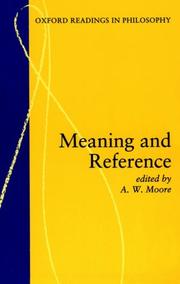
ISBN: 0198751257 0198751249 9780198751250 9780198751243 Year: 1993 Publisher: Oxford : Oxford University Press,
Abstract | Keywords | Export | Availability | Bookmark
 Loading...
Loading...Choose an application
- Reference Manager
- EndNote
- RefWorks (Direct export to RefWorks)
This volume presents a selection of the most important writings in the debate on the nature of meaning and reference which started one hundred years ago with Frege's classic essay "On Sense and Reference." Contributors include Bertrand Russell, P.F. Strawson, W.V. Quine, Donald Davidson, John McDowell, Michael Dummett, Hilary Putnam, Saul Kripke, David Wiggins, and Gareth Evans. The aim of this series is to bring together important recent writings in major areas of philosophical inquiry, selected from a wide variety of sources, mostly periodicals, which may not be conveniently available to the university student or the general reader.
Philosophy of language --- Reference (Philosophy) --- Meaning (Philosophy) --- Language and languages --- Langage --- --Philosophie --- --Frege, Gottlob (1848-1925) --- Philosophy --- 4434 --- -Meaning (Philosophy) --- Referring, Theory of --- Theory of referring --- Semantics (Philosophy) --- Foreign languages --- Languages --- Anthropology --- Communication --- Ethnology --- Information theory --- Meaning (Psychology) --- Philology --- Linguistics --- --Frege, Gottlob, --- Language and languages - Philosophy --- Philosophie --- Frege, Gottlob, 1848-1925 --- Référence (philosophie) --- Signification (philosophie) --- Meaning (Philosophy). --- Reference (Philosophy). --- Philosophy.
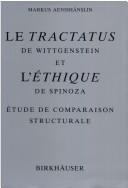
ISBN: 3764325089 303488592X 9783764325084 Year: 1993 Publisher: Basel : Springer,
Abstract | Keywords | Export | Availability | Bookmark
 Loading...
Loading...Choose an application
- Reference Manager
- EndNote
- RefWorks (Direct export to RefWorks)
Wittgenstein et Spinoza construisent, l'un dans le Tractatus, l'autre dans l'Éthique, des systèmes philosophiques réunissant le monde, l'homme et Dieu dans lesquels ils s'opposent sur de nombreux points. C'est ainsi par exemple que, suivant Spinoza, l'homme est assuré que rien ne se produit sans cause alors que Wittgenstein rejette la possibilité de rapports d'ordre causal entre les événements. Le présent travail dissèque dans une première partie l'œuvre de Wittgenstein, il analyse dans une deuxième partie la doctrine de Spinoza, et il compare enfin dans la troisième partie les deux systèmes dont il fait ressortir les points de concordance et de dissemblance dans leurs constructions respectives. Il traite les œuvres philosophiques que sont le Tractatus et l'Éthique comme si elles relevaient de sciences telles que la mécanique, l'astronomie, etc., et utilise des modèles géométriques appropriés à leur interprétation. L'étude comparative du Tractatus et de l'Éthique, qui ne cessent d'exercer leur influence sur la pensée humaine, permet de conclure que le Tractatus, œuvre du XXe siècle, renoue avec le rationalisme du XVIIe siècle exprimé par Spinoza.
Logic, Symbolic and mathematical. --- Language and languages --- Ethics. --- Philosophy. --- Logic [Symbolic and mathematical ] --- Logica [Symbolische en wiskundige ] --- Logique symbolique et mathémathique --- Philosophy (General). --- Philosophy, modern. --- Logic, Symbolic and mathematical --- Ethics --- Ethique --- Logique mathématique --- Philosophy & Religion --- Philosophy --- Wittgenstein, Ludwig, --- Spinoza, Benedictus de, --- Wittgenstein, Ludwig --- Spinoza, Benedictus de --- Language and languages - Philosophy.
| Listing 1 - 10 of 14 | << page >> |
Sort by
|

 Search
Search Feedback
Feedback About UniCat
About UniCat  Help
Help News
News